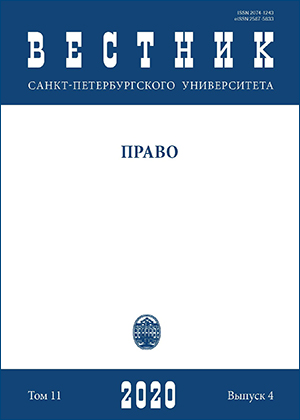Contract for the international sale of goods: Principle of autonomy of the will of parties within documents of the Hague Conference on Private International Law
DOI:
https://doi.org/10.21638/spbu14.2020.409Abstract
The article is devoted to the analysis of legal regulation dealing with choice-of-law agreements by parties to international sale of goods contracts, namely in two documents of the Hague Conference on Private International Law: the Convention of 1955 on the Law Applicable to International Sales of Goods (in force) and the Convention of 1986 on the Law Applicable to Contracts for the International Sale of Goods (not yet in force). The Convention of 1955 sets a strict standard of autonomy of will (choice of a country’s domestic law; based only on the terms of the contract). Having a small number of participants and characterized by inconsistent law enforcement practice, this convention, nevertheless, is a valid legal instrument which Russian actors in the field of external trade should take into account when cooperating with nationals of member states. The Convention of 1986 establishes a substantively more liberal autonomy of will standard (change of the applicable law; demonstrated by the terms of the contract and the conduct of the parties in their entirety). However, many participants in the drafting procedure led to a wide range of views in regard to parties’ autonomy (including diametrically opposite ones). This resulted in a compromise nature of the solutions (and even the drafters’ direct refusal to address parties’ choice sensitive issues: choice of lex mercatoria, depecage) and, likely, an insufficient adoption for the Convention to enter into force. The Conventions’ basic principles (1955 — irrespective of having a few number of participants; 1986 — irrespective of not entering into force) have the potential for practical application in international commercial arbitration. In the case of parties’ autonomy, such an application would be limited to its recognition as far as the standard of the first is strict and somewhat outdated, whereas the standard of the second has been accepted in the framework of discord between states and avoids addressing sensitive issues in its implementation.
Keywords:
autonomy of will, applicable law choice, choice-of-law agreement, choice-of-law clause, international purchase and sale, purchase and sale contract, conflict of laws, conflict rules unification
Downloads
References
Downloads
Published
How to Cite
Issue
Section
License
Articles of "Vestnik of Saint Petersburg University. Law" are open access distributed under the terms of the License Agreement with Saint Petersburg State University, which permits to the authors unrestricted distribution and self-archiving free of charge.






